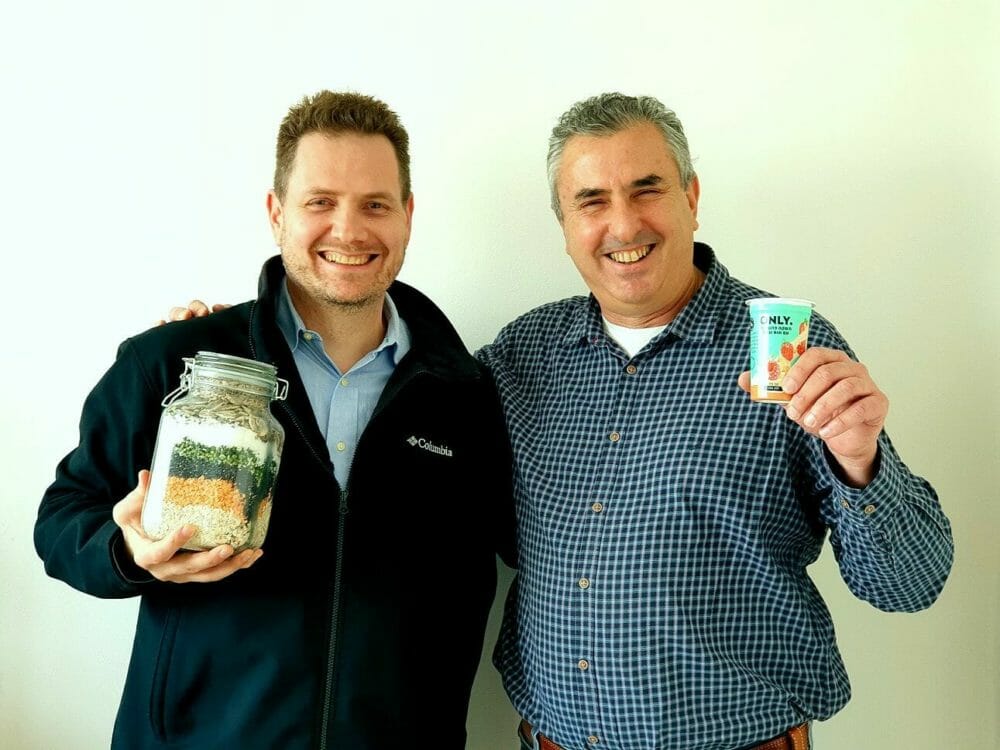Last September, AFN churned out a long-read on Israel’s emergence as “a land of alt milk and AI honey.” That wrapped up with a trip to the Kitchen Hub, a food tech incubator established by the Strauss Group five years ago with support from the Israeli government. Handed out there during a foodtech-inspired Rosh Hashanah lunch were batches of plant-based yoghurts from one of the Kitchen’s portfolio companies, Yofix Probiotics. These, I wrote at the time, had “a refreshing banana flavor made from oats, legumes and seeds — and soy-free.”
This week — with the team at Yofix confirming the closure of its Series A funding round at $2.5 million — it is now clear that a few dairy behemoths have also acquired a bit of a taste for those same plant-based yogurts. “In the fast-growing dairy alternative space, Yofix offers a unique range of quality products, both in terms of flavor and texture,” said Benjamin Bugl, a managing director at Müller Ventures, the Swiss early stage investment arm of the German yogurt-making billionaire Theo Müller.
Writing in a statement sent to AFN, Bugl also highlighted how Yofix had set itself apart by its ability to make products that are “clean-label,” and using “no artificial ingredients.” This approach, Bugl added, gives Yofix “a powerful differentiator for consumer awareness and acceptance. Combined with Yofix’s strong management team, this makes it an attractive investment opportunity for Müller.”
Leading the round alongside Muller Ventures was the tech-focused private equity firm LionTree Partners, and another dairy titan — the Bel Group, which is the company behind soft cheese brands like BabyBel and Boursin.
A first time foray for Bel Group
“Bel Group is entering the plant-based arena for the first time,” said Caroline Sorlin, who is the general manager for Bel Group’s plant-based acceleration unit, in a statement. “So this gives concrete expression to our strategy of combining the best of dairy and plant-based products.”
The team at Yofix, in an interview with AFN, says its achievement is also down to a proprietary zero-waste production process, rather than just the product formulae themselves. The fermented formula is soy-free and composed of a short list of ingredients, including oats, lentils, and sesame. The aim is to deliver the classic flavor and probiotic functionality of dairy yogurts without the dairy ingredients, serving the lactose-intolerant and dairy-allergic population as well as offering a plant-based solution for the growing vegan and flexitarian markets.
Speaking to AFN by phone, Yofix CEO Steve Grün outlined his company’s decision to go down the clean label route, providing reasons for why they felt they needed to steer clear of soy and almonds. “It’s really easy to shortcut your way to a plant-based yogurt,” he said. “You can add preservatives, emulsifiers. You need to add all kinds of thickness — we’re not adding all kinds of shortcuts. We’re keeping it clean-label.”
And why not go down the soy route, like other plant based milk producers? “Market research got to me that there are more people reluctant to try soy than reluctant to dairy,” he said. “In some countries, soy is still very controversial.” Almonds, he added, referring to another popular plant-based option, came with certain “ecological problems,” owing to their production in water-deprived areas like California.
He described the experience of setting up his company’s own factory and its domestic production and distribution success as a template for international expansi0n, though he did not yet specify exactly when this expansion would happen, or the exact brand they’ll come to market with in places like western Europe. He did, however, express interest in launching more lines of cheeses, frozen desserts, and milk alternatives under a hitherto unlaunched brand.
One advantage for keeping things clean label versus lab grown dairy options is that Yofix should not have too much regulatory trouble entering the European market. It might be harder, for instance, for cultivated dairy companies like Singapore’s TurtleTree Labs — which is working on lab-growing alternatives to breast milk and snow leopard milk.





